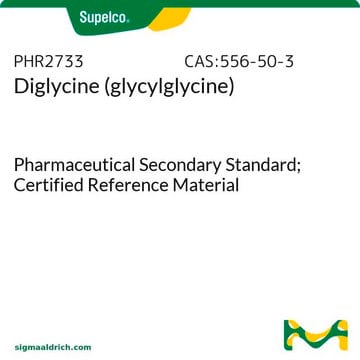PHR1111
Glycine
Pharmaceutical Secondary Standard; Certified Reference Material
Synonyme(s) :
Acide aminoacétique, Acide aminoéthanoïque, Glycocolle
About This Item
Produits recommandés
Qualité
certified reference material
pharmaceutical secondary standard
Niveau de qualité
Agence
traceable to Ph. Eur. G0450000
traceable to USP 1295800
Famille d'API
glycine
CofA (certificat d'analyse)
current certificate can be downloaded
Technique(s)
HPLC: suitable
gas chromatography (GC): suitable
pKa (25 °C)
(1) 2.35, (2) 9.60
2.35
Pf
240 °C (dec.) (lit.)
Application(s)
pharmaceutical (small molecule)
Format
neat
Température de stockage
2-30°C
Chaîne SMILES
NCC(O)=O
InChI
1S/C2H5NO2/c3-1-2(4)5/h1,3H2,(H,4,5)
Clé InChI
DHMQDGOQFOQNFH-UHFFFAOYSA-N
Vous recherchez des produits similaires ? Visite Guide de comparaison des produits
Description générale
Application
Actions biochimiques/physiologiques
Remarque sur l'analyse
Autres remarques
Note de bas de page
Produits recommandés
Produit(s) apparenté(s)
Code de la classe de stockage
11 - Combustible Solids
Classe de danger pour l'eau (WGK)
WGK 1
Point d'éclair (°F)
Not applicable
Point d'éclair (°C)
Not applicable
Faites votre choix parmi les versions les plus récentes :
Déjà en possession de ce produit ?
Retrouvez la documentation relative aux produits que vous avez récemment achetés dans la Bibliothèque de documents.
Les clients ont également consulté
Notre équipe de scientifiques dispose d'une expérience dans tous les secteurs de la recherche, notamment en sciences de la vie, science des matériaux, synthèse chimique, chromatographie, analyse et dans de nombreux autres domaines..
Contacter notre Service technique










